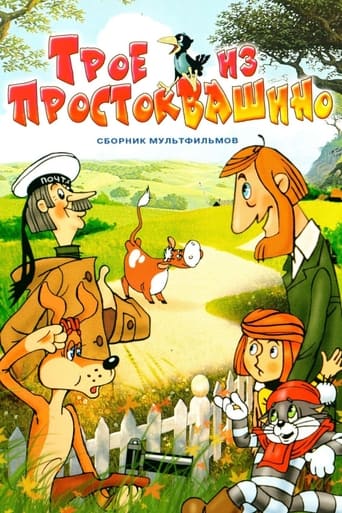Horst in Translation ([email protected])
"Three from Prostokvashino" is a Soviet 18-minute short film from over 35 years ago. It was directed by Vladimir Popov and written by Eduard Uspenskiy. Both worked on several other famous animated films. The story here is about a boy who is not allowed to have a cat as a pet. so he leaves home and moves into his own place where he has a cat and dog. The cat is more the reasonable type, the dog is really more the loyal one in terms of their friendship to the boy. I must say I did not find the animation typically Soviet, but there are other components (apart from the language of course) that had Russian written all over them. One would be that it is fairly common in these films that grown women speak young male characters. Or that (speaking) animals are fairly common, there's not only a cat and dog in here, but also a bird and a cow for example. Another would be the humour, especially the last scene with the postman and the bike. If you enjoyed this film, make sure to check out the sequels. I personally thought it was a decent watch, solid animation, okay humour and heart, but there was nothing really outstanding about it. Still I recommend it I guess. Not bad by any means.
superperson1
Among the more perfect Soviet cartoons. No possible complaints about this one. It's compassionate, charming, and clever. A considerate, principled, not-vomit-inducingly-adorable boy, some witty anthropomorphic household pets, some bantering grown-ups to keep the adult contingency entertained, a hapless proletariat postal worker, and sincere, uncondescending Soviet wholesomeness and humor. Who could ask for anything more? Looking back at the pop culture of the Soviet sixties and seventies, when movies were original and funny, and cartoons were earnest and idealistic, when there wasn't sarcasm or cynicism, it does give you the perhaps entirely false but nonetheless sober impression that Soviet citizens were once happy, for a time. This cartoon is one of the reason Russians look back at this era nostalgically and to watch this cartoon is to fondly recollect the warmth and wit that that part of the world lost in the past two decades
evie_e
I've seen the cartoon several times, since I was a child (I was born in Russia). It is based on a sweet book, which I've also read. It is preferable for one to know Russian for a full understanding of the wit and the humor in the story, but not so necessary. It is a unique cartoon that is watched and loved by several generations in Russia (my parents love it)and for very good reasons: clean but not childish humor, smart characters and nice songs. For someone who grew outside of Russia, it will be interesting to see the life of an ordinary Russian family back in the 70's, or to be exact - how it was portrayed through a cartoon. The quotes from the cartoon are known to almost everyone in Russia.
Eric N.
The three series of the Prostokvashino cartoon, "Troiye iz Prostokvashino" (Three from Prostokvashino), "Kanikuli v Prostokvashino" (Vacation to Prostokvashino), and "Zima v Prostokvashino" (Winter in Prostokvashino) center around the advertures a boy, Fyod'r, has after running away from his home in Moscow to this small Russian town with his new-found cat. On the way, he finds a dog who offers them a dacha he found, and postman Peshkin soon comes along to look after the trio. When Peshin tells Fyod'r's parents back in Moscow of his whereabouts, the family soon finds Prostokvashino to be a very inviting and friendly place, where there is no shortage of adverture and things to do, as well as trying to keep tensions down between everyone when they start to get bored. Filled with humor and jokes, "Prostokvashino" is one of the best television programs ever to come out of Brezhnyev's USSR, frequently appearing on the children's program "A-B-V-G-D" (the first 5 letters of the Russian alphabet). "Prostokvashino" is still popular with children today throughout the former Soviet Union.


